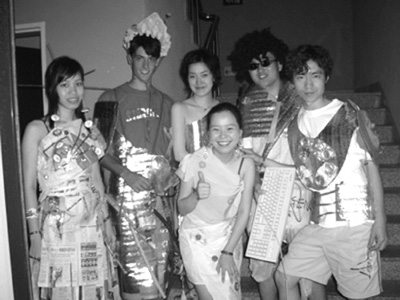
By Samuel Ullman
Under the theme of ?ustainable Environmental Development and Action Scheme for Youths,108 youths from about 30 countries gathered in Seoul to share their ideas and discuss what the youth can do in order to balance economic development and environmental protection towards a sustainable development.
The forum was co-hosted by the National Council of Youth Organizations in Korea (NCYOK) and International Work Organization (IWO); sponsored by Ministry of Culture and Tourism and Korean Federation for Environmental Movement.
For eight days in Pyungchang National Youth Center, from Aug. 18 to 25, participants were divided into 10 groups named after main topics in environmental issues: air, water, population, globalization, forest, weather, nuclear, ecosystem, recycle, and energy. The program included lectures, group discussions, mock courts, free-debating and a cultural night for cultural exchange and a more mutual understanding.
Many participants including Anti Hytti (Finland) and Joey Imson (Philippines) were in their twenties and actually environmentalists in their own countries and representatives of certain NGOs like Green Road Association (Shaghai, China), and Earthlink (Singapore).
The debates and discussions were conducted in a free style manner as it aroused and inspired participants to be active. For instance, a group of ten was interested in ?eligions and environment. They just sat outside the main building on the benches and grass, each of them engaged in different religion, first introduced their religions and agreed on how religion can actually influence people to become environmentally awaken owing to such strong power it has within a society.
Furthermore, Ina Shroder (25) from Germany said, ? believe that religion has its influences even on non-religious people. And in this sense, it would be better if more religious representatives become concerned with environmental issues. All religions lead to one fundamental state, the state of peace: it can only be achieved when we breathe clean air or drink fresh water In addition, they came to an agreement that as religious people, the youths themselves can be the ones leading such a movement in their own religious gatherings.
The heated discussions and debates were also based on two lectures on landscape convention and wildlife & wetland.
In the Mock Court everyone played a role as a jury, a judge, a defendant, or an accuser. In the court, economic development was accused of environmental destruction. After much debate, it was found that economic development can be helpful in restoring the damaged environment. Environmental destruction was nonetheless found guilty, for it had the responsibility for its past deeds.
The 15th International Youth Forum was a great opportunity for the youth from different parts of the world with various identities and thoughts to come together. It was a chance to re-confirm that there are youths who are concerned with the earth? environment, which promises a better future- the future with more environmental friendliness and less reckless destruction.
?e can make a difference. We believed that it? possible to conserve our environment while developing mankind and our countries... United we stand. As much as the environmental concerns are real and pressing, we will continue to build on our global network and mutual understanding to synergize our efforts for the next generation.
From the 2004 Seoul Declaration.
hjjewel@ewha.ac.kr
Ewha Voice
evoice@ewha.ac.kr

